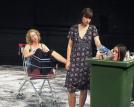Visits to the Archive no. 6: What makes the French French and the Germans German?
Our third experiment ever took place in the summer of 2006. Involving a team of artists from France, Germany and Denmark, it was also our first international experiment.
The purpose was to examine and compare the political theatre of three different European countries, and to discuss the current potential of political art across national borders and traditions.
The experiment lasted six days. The three auteurs (director-playwrights) Eugène Durif, Clemens Bechtel and Nina Bassett worked separately with their groups on a theme of their choice, and on the final day the work and the reflections were presented to all the participants and an invited audience of Danish performing artists.
For the Laboratoriet facilitators, Isabelle Reynaud and Jens-Christian Led, the experiment also led to observations about some of the more curious differences between French, German and Danish working methods:
"The French worked with a very symbolical and poetical text. It is obvious that Catholicism (...) still plays an important part in how the majority of the French understand themselves and their society. When Durif uses dogs as a general theme and has them represent the French bourgeoisie, he is not just playing on the fact that members of the bourgeoisie and dogs are made as equals, but also the French catholic fables where animals act as role models defining what constitutes good catholic behaviour. When Prugnaud made use of the vulgar and sexually challenging it was an obvious attack on Catholicism in France that still continues to contribute to the repression of sexuality in the public sphere. (...) As for the way in which the group worked, with its high level of energy and a daily rhythm shifting from chaos to focus, it is easy to view that as an expression of a Latin temper and a will to interchange between highly intellectual debate and practical and physical theatre work.
The work of the Germans was wrapped in German tradition and history in a similar way. When Bechtel refrains from wanting to educate and lecture the audience, asking them to condemn Islamic terrorism, it may be viewed as a reaction to the German post-war theatre, which like Brecht’s theatre was designed to re-educate the German people teaching them democracy and tolerance. For most Germans of Bechtel’s Generation, this desire to educate has had an unforeseen side effect, and now the focus is on presenting political problems and then have the audience decide for themselves how to solve them. (...) There is a long-standing tradition in Germany to consider theatre as an important institution both politically and in society. Therefore it is no wonder that the German group used material gathered in the political reality that they wanted to convert to theatre, and that they were very serious in their approach to the material.
Perhaps it is a little harder to point out what was especially Danish about the Danish group. One might however consider Danish to be something marked by a very long history of being a small state, who has learned to its cost that it is unwise to meddle in international conflicts. It is much better to look inwards and form the democratic welfare state, instead of looking outwards on a world where there is nothing to gain and everything to lose. Looking at it that way the way in which the group chose to work together would seem very Danish. Everyone had a say, and they chose content and material that was very close to them: the personal walks through the streets surrounding the theatre, stories from the local newspaper and the stories on the groceries of the local supermarket. The irony used in the presentation has a similar Danish feel to it; a sort of light and ironic smile when you see what is around you.
These traits were quite clear, when you looked at the work of the three groups and they cannot be dismissed as rigid Euro-stereotypes. That is to say these differences were there, and it is possible to trace them back to national traditions in the three countries."
See the experiment video documentation here:
www.laboratoriet.org/archive/video/experiment-3-political-drama-european-perspective
To celebrate Laboratoriet's anniversary, artistic director Barbara Simonsen is making this series of Visits to the Archive, rediscovering 10 years of performing arts experiments and artistic research at Laboratoriet.

